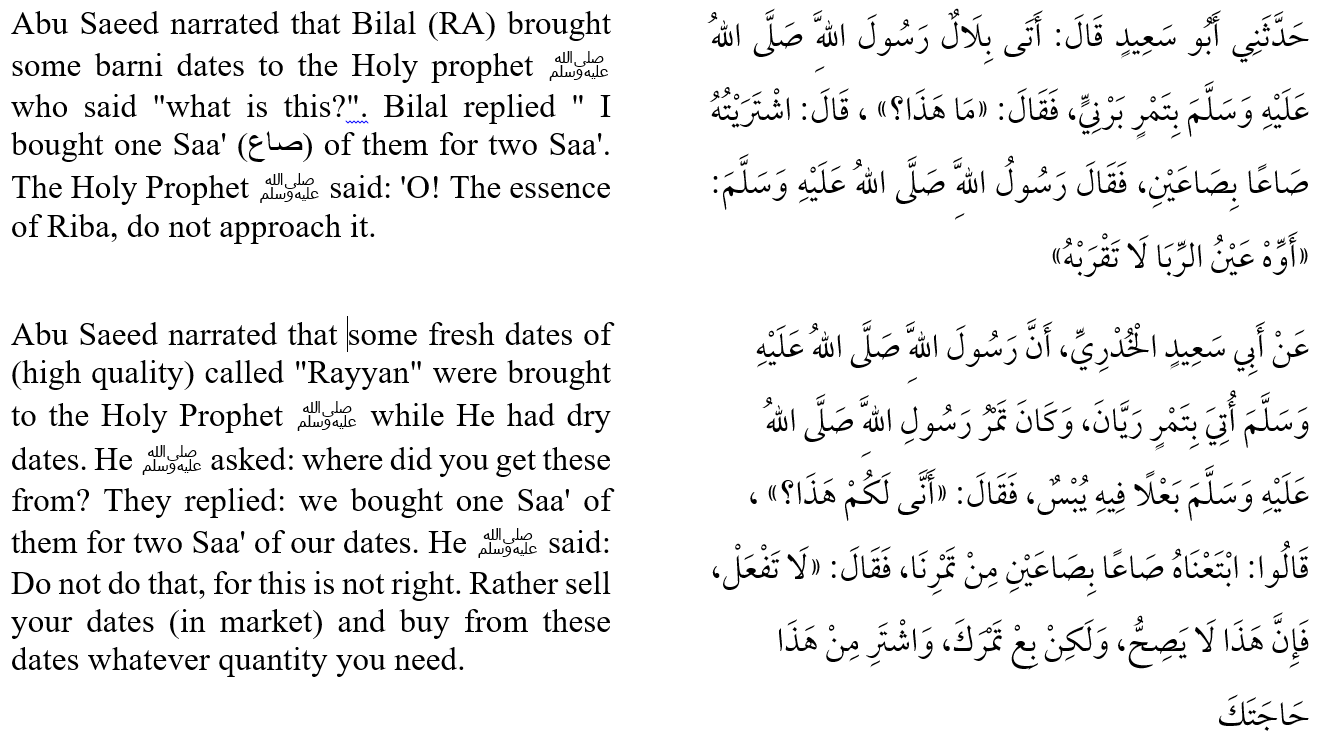Explanation of Hadith of Riba Al-Fadl
Muhammad Abubakar Siddique,
Lecturer, Int’l Institute of Islamic Economics (IIIE),
Int’l Islamic University, Islamabad.
Website: http://islamicfina.com/
………………………………………………………………………….
Video Lecture of of This article
It would be good if you read some important concept before understanding the Riba (interest) – Click here
………………………………………………………………………………………………………………………………..
Definition of Riba Al-Fadl:
عَنْ عُبَادَةَ بْنِ الصَّامِتِ، قَالَ: قَالَ رَسُولُ اللهِ صَلَّى اللهُ عَلَيْهِ وَسَلَّمَ: «الذَّهَبُ بِالذَّهَبِ، وَالْفِضَّةُ بِالْفِضَّةِ، وَالْبُرُّ بِالْبُرِّ، وَالشَّعِيرُ بِالشَّعِيرِ، وَالتَّمْرُ بِالتَّمْرِ، وَالْمِلْحُ بِالْمِلْحِ، مِثْلًا بِمِثْلٍ، سَوَاءً بِسَوَاءٍ، يَدًا بِيَدٍ، فَإِذَا اخْتَلَفَتْ هَذِهِ الْأَصْنَافُ، فَبِيعُوا كَيْفَ شِئْتُمْ، إِذَا كَانَ يَدًا بِيَدٍ» مسلم: حدیث 1587
Ubadah ibn-e-Thabit (RA) narrated that Holy Prophet (SAWW) said: “Gold for gold, silver for silver, wheat for wheat, barley for barley, dates for dates, and salt for salt – like for like, equal for equal, and hand-to-hand; if the commodities differ, then you may sell as you wish, provided that the exchange is hand-to-hand.”
Explanation:
Case – 1: Items of exchange are homogenous.
| Goods-1 | Goods-2 | How to Exchange? |
| Gold | Gold | On equal and at the spot |
| Silver | Silver | |
| Wheat | Wheat | |
| Dates | Dates | |
| Salt | Salt | |
| Barley | Barley |
Rule No.1 : Homogenous exchange of goods will be concluded on 1. Equal 2. At the Spot basis.
Case – 2: Items of exchange are heterogeneous [1] then exchange them as you wish[2], but it would be done only on Hand to hand (at the spot) [3] basis.
Rule No. 2: Heterogeneous exchange of goods will be concluded at the Spot only [equality doesn’t matter]
Explanation: Heterogeneous exchange like gold for Silver, Silver for gold , Wheat for dates etc
……………………………………………………………………………….
Q: Does quality of goods matter in these exchanges?
Quality of goods does not matter in these exchanges. It is extracted from following ahadith:
Note: From these Ahadith, jurists extracted that quality does not matter in homogeneous exchange of goods. If someone insist to do such exchange, he must do it but on equal and at the spot basis. If he intends to make profit then he is not allowed to do unequal exchanges or exchange with delay. If he wants some benefit, then he must go to the market sell it for cash and then buy another goods.
Rationale Behind ignoring the quality in such exchanges:
- Quality is standard less concept. It depends upon personal assessment. In real life sale and purchase, people usually make high quality goods low quality while buying and vice versa while selling. It was quite possible that people will open the door of riba, if quality determination is left on their will. They will start to exchange of goods changing their qualities according to their need of money etc. Example: Person A has high quality goods and Person B has low quality goods. Person A needs goods of B. Person B claims that his goods is of high quality and he will give him 4kg of his goods for 3kg of goods of person A. In this way Mr. B will exploit Mr. A.
- In barter transaction, if the same commodity is exchanged it is likely that a party with ability to judge difference in quality will exploit the ignorance of less knowledgeable party in giving him less than the real value of the commodity. Therefore, the lawgiver has safeguarded him against injustice and exploitation by stipulating that the exchange should be equal on both sides.[4]
Rationale behind equal quantity in Simultaneous exchange.
- An unequal exchange of the same commodity gives way to hoarding, monopoly and profiteering. The rich man, for example, gives 1 kg of superior dates for 5 kg inferior dates. What actually happens that all the inferior dates are transferred to the rich man at the cost of 1/5 amount of the superior dates with him, with the following results:
(i) A huge amount of dates has been stored with the rich man. He starts hording them.
(ii) The small quantity of the superior dates in the hands of a large number of poor persons will soon be finished. Only the inferior quality of dates will be left over in the market.
(iii) The rich man will monopolize the inferior dates and sell them in the market at very high rates, even higher than the normal market rates of the superior dates.[5]
- By prohibiting unequal exchange of the same commodity, Islam has in fact encouraged the use of cash money. The Prophet ﷺ had instructed to sell two Saa’ of dates for money (darahim) and then purchase superior ones with that money. Thus, the hadith relating to riba seek to promote money as medium of exchange in the economy.[6]
Rationale behind the Hand to Hand condition
Deferred delivery brings undue benefit for one party. For example Mr. A sells $100 to Mr. B for Rs. 5500 to be delivered next year. By next year the exchange rate in the market has changed from 1 $ 55 Rs. To 1 $ 65 Rs. But Mr. B will deliver Rs. 5500 only not Rs. 6500. This shows that benefit of change in exchange rate over the year went to one party i.e. in this case Mr. B. If exchange rate moved in other direction, Mr. A would have been the gainer. In short one party will gain while the other will lose.[7]
Economic benefit of prohibition of Riba Al-Fadl
When a person, who has a high quality goods, will come to know that he is not allowed to exchange his goods with low quality except on equal basis, he will not agree to exchange it on equal basis because it would cause him loss. Therefore, he will go to the market. He will sell his goods and get money. He will buy the goods, whatever he will need, from the market. He will play two roles as supplier (seller) and as consumer (buyer) in the market. Supply demand forces of market will become strong that will lead to the stable equilibrium of the market and it would make stable economy, if all such transactions are done at macro level. Because Holy Prophet ﷺ did not advise only his companion to go to the market and sell it with price and then buy whatever he wanted. Rather it was advised to whole Ummah.
Will the Rules of Riba al-Fadl be applied on the exchange of goods other than the six goods mentioned in Hadith?
Second caliph Umar Farooq (RA) did not restrict riba al-fadl into these six goods only. Rather he used to apply riba al-fadl rules on every sale/exchange that is done on same kinds of goods. Once he was asked whether one sheep can be sold for two sheep, he disliked and considered that sale as Makrooh. Though other jurists allow such sale but second caliph disliked on the base of taqwa (purity).
There are two groups about this issue.
Zahiri School: Ibn-e-Hazm Zahiri says there is no need to apply these rules on the exchanges of the goods other than these six goods mentioned in hadith.
Jamhoor (Majority): Hanfi, Malki, Shaf’i and Hanbali are of the view that these rules are extendable to the exchanges of other commodities other than these six goods. Other goods can be rabawi goods, but there will be specific criteria for this.
Note: Jamhoor unanimously says that we will search the ‘illah (reason) that is common in above mentioned exchanges of six goods in hadith. All those goods would be considered rabawi, if that ‘illah exist in them. So Riba al-fadl rules will be applied in all those exchanges of goods in which that ‘illah will exist. However, they differ to each other regarding fixing the ‘illah.
Best Reading Material to understanding the Concept of Riba
………………………………………………………………………………………………………
[1] If the commodities differ فَإِذَا اخْتَلَفَتْ هَذِهِ الْأَصْنَافُ like gold for Silver, Silver for gold , Wheat for dates etc.
[2] As you wish means equality does not matter.
[3] Hand to Hand means “at the spot basis”. Delay is not allowed in any counter value.
[4] Mansoori, Dr. M. Tahir, Islamic Law of contracts and Business Transactions, ch. 9.
[5] Mansoori, Dr. M. Tahir, Islamic Law of contracts and Business Transactions, ch. 9. [Ghulam Murtaza, Socio-Economic System of Islam, Lahore: Malik Sons Publishers, 1990, pp. 34, 35.]
[6] Mansoori, Dr. M. Tahir, Islamic Law of contracts and Business Transactions, ch. 9.
[1] Mansoori, Dr. M. Tahir, Islamic Law of contracts and Business Transactions, ch. 9.
![]()


